Growing Rice Debt Free
Air Date: Week of April 3, 2009
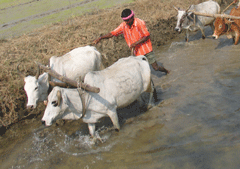
Rice farmers plow oxen in Orissa, India. (Photo: Subhashree Pradhan)
In recent years there have been many reports about desperately indebted farmers in India. Now, some farmer advocates there are trying to find low-cost and low-tech solutions to India's tired soil - solutions that can increase fertility and yield without more trips to the moneylender. Beth Hoffman reports.
Transcript
CURWOOD: Throughout the world, farmers have become increasingly dependent on artificial fertilizers and pesticides to boost production. But the costs are high – and many poor farmers end up buried in debt.
Beth Hoffman reports now from Orissa, India on attempts by farmers there to break this cycle of chemical dependency.
HOFFMAN: It was a hot and dry day in January when I met the Krishna family in the cool of a grass shade structure beside the family’s rice field. In front of us, on the hard packed mud “patio,” sat a small mound of rice, what is left of the harvest for this year. Much of the rest has gone to pay the local moneylender, who just so happened to pay a visit while I was there.
[KRISHNA TALKING]
KRISHNA: That was the moneylender. I borrowed 2000 Rupees from him in June, and now, six months later, he’s come to collect 5000 Rupees worth of rice.
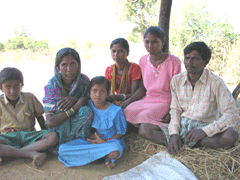
The Krishna family—rice farmers in Nuapada District of Orissa, India. (Courtesy of Beth Hoffman)
KRISHNA: We don’t have goats, we don’t have cows. And because there are less cattle now all the families are using chemical fertilizers.
HOFFMAN: Without cows and cow dung, farmers have to buy chemical fertilizers like urea and phosphate. But over the past five years, while the cost of that fertilizer has risen, yields have dropped. Many, including Nimain Charan Swain, the Deputy Directory of Agriculture in Orissa, believe the low yields are in fact caused by chemical use.
SWAIN: The thing is that from applying the fertilizer for so many years, the soil health is reduced.
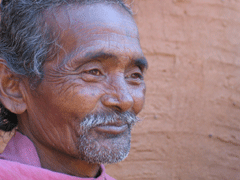
Rice farmer Buddharam Dal says he’s struggling to pay back
loans he took from the local moneylender. (Photo: Beth Hoffman)
SWAIN: To revive the soil health, the government is now trying biofertilizers, biopesticide. These are things that encourage the farmers not to use chemical fertilizer.
HOFFMAN: But while officials say they support eco-friendly agriculture, that’s not how the government has been spending its money. This year the Indian government will spend one billion dollars on subsidies paid directly to fertilizer companies.
[KRISHNA SPEAKING]
HOFFMAN: So Krishna, and thousands of farmers like him, are stuck – taking out loans to pay for something that harms their soil. Yet somehow he remains optimistic that things will change for his family, someday.
KRISHNA: This year I don’t think we will have enough to eat. I think it will take about five years for us to pay off the debt we have. Then things will be better in the future.
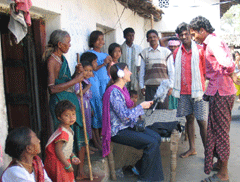
Reporter Beth Hoffman records a farmer singing a traditional song sung to oxen while rice farming. (Photo: Subhashree Pradhan)
[PRO-BIOTECH PROPONENTS: “Over the past hundred years our food supply has greatly”…”Imagine, a world with enough food for everyone and a clean, healthy environment”….”As a scientist working with biotechnology, I know the scientific side…”]
HOFFMAN: But all these answers are expensive and often rely on unreliable governments. Instead, advocates in rural India believe the solution is to make farmers more self-reliant, by using free, low-tech solutions, like organic farming and something called SRI, a System of Rice Intensification.
[SOUND OF PEOPLE WORKING IN THE MUD]
HOFFMAN: A group of men and women work in knee high mud with rope and a tool that looks like an oversized pizza cutter. They draw a grid in the mud and plant the seedlings in this grid.
[SOUND OF PEOPLE WORKING IN THE MUD]
NIAL: I am telling him this is the long process – it takes time, a long time.
[SOUND OF PEOPLE WORKING IN THE MUD]
HOFFMAN: Suklambar Nial works with a local non-profit, training farmers in SRI. The method uses as little as one tenth of the seed and far less water than conventional rice farming. And the yields have been impressive.
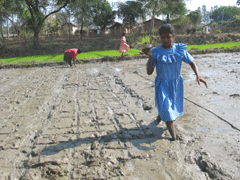
A school girl helps plant rice seedlings in the SRI grid pattern. (Photo: Beth Hoffman)
[SOUND OF PEOPLE WORKING IN THE MUD AND TALKING]
HOFFMAN: These results have not gone unnoticed. Worldwide, there are now an estimated one million farmers using the SRI method. The World Wildlife Federation, and the World Bank, now sanction its use. And there are no patents or intellectual property involved – it’s free for farmers to use.
[SOUNDS OF PLAY]
HOFFMAN: These farmers are excited enough about the technique that they invited me back that evening – to watch a play they developed, where farmers teach one another about SRI.
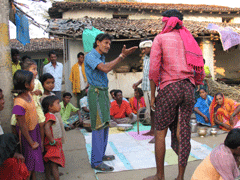
Farmers present a play about SRI farming in the town of Krishna in Nuapada, Orissa. (Photo: Beth Hoffman)
HOFFMAN: But even with good farming techniques, poor farmers still need a source of nitrogen to keep the soil fertile.
[SOUND OF STIRRING]
HOFFMAN: A few miles away lives Belmati Sabar, also a rice farmer. She and her family are from a lower caste, with little in the way of property or cows. So to take care of her fields, Sabar stirs a mixture of what she calls “magic compost” – a fermented concoction of leaves from common plants, homemade sugar and a small amount of cow dung she collects on the streets of her village.
NIAL & SABAR: After 10 to 12 days it will make compost.
HOFFMAN: The mixture is not a new idea - it has been used for centuries in India. But scientists have worked to update and improve the recipe. Plus, like SRI, it’s free and uses only items easily found, keeping money in the village.
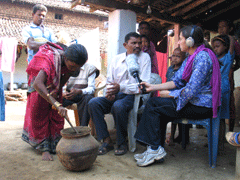
Belmati Sabar stirs her magic compost while reporter Beth Hoffman records. (Photo: Subhashree Pradhan)
HOFFMAN: Here a farmer sings a traditional song sung to oxen while plowing the rice fields, now adapted for the farmers' SRI play. He too is using the old to connect with the new, updating the traditional with the scientific. Continuing the way farming has always evolved.
For Living On Earth, I am Beth Hoffman in Orissa, India.
[SINGING]
CURWOOD: Just ahead – searching for the quiet places of nature in our noisy world. Stay with us - on Living on Earth.
ANNOUNCER: Support for the Environmental Health Desk at Living on Earth comes from the Cedar Tree Foundation. Support also comes from the Richard and Rhoda Goldman fund for coverage of population and the environment. And from Gilman Ordway for coverage of conservation and environmental change. This is Living on Earth on PRI, Public Radio International.
Links
For more on Norman Uphoff, click here.
To learn about the System of Rice Intensification (SRI) in Bangladesh, click here.
Living on Earth wants to hear from you!
Living on Earth
62 Calef Highway, Suite 212
Lee, NH 03861
Telephone: 617-287-4121
E-mail: comments@loe.org
Newsletter [Click here]
Donate to Living on Earth!
Living on Earth is an independent media program and relies entirely on contributions from listeners and institutions supporting public service. Please donate now to preserve an independent environmental voice.
NewsletterLiving on Earth offers a weekly delivery of the show's rundown to your mailbox. Sign up for our newsletter today!
 Sailors For The Sea: Be the change you want to sea.
Sailors For The Sea: Be the change you want to sea.
 The Grantham Foundation for the Protection of the Environment: Committed to protecting and improving the health of the global environment.
The Grantham Foundation for the Protection of the Environment: Committed to protecting and improving the health of the global environment.
 Contribute to Living on Earth and receive, as our gift to you, an archival print of one of Mark Seth Lender's extraordinary wildlife photographs. Follow the link to see Mark's current collection of photographs.
Contribute to Living on Earth and receive, as our gift to you, an archival print of one of Mark Seth Lender's extraordinary wildlife photographs. Follow the link to see Mark's current collection of photographs.
 Buy a signed copy of Mark Seth Lender's book Smeagull the Seagull & support Living on Earth
Buy a signed copy of Mark Seth Lender's book Smeagull the Seagull & support Living on Earth

